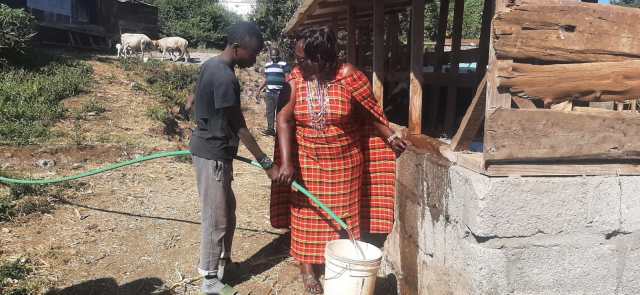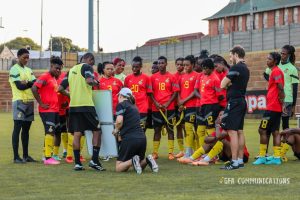Empowering voices: Kajiado widows lead the way in conservation

“A woman with a voice is by definition a strong woman. But the search to find that voice can be remarkably difficult.”
This is a sentiment that the widows of the Osiligi Women Group in Kajiado County embody as they unite to champion conservation and camaraderie.
At the helm of this inspiring group is 59-year-old Elizabeth Senei, a widow for over 11 years and the Chairlady of Osiligi, which means “hope.”
Senei founded the group to help widows in her community earn a living and support their families.
During the peak of COVID-19 in 2020, Senei recognized the dire need for a formal organization to assist widowed women whose cries for help were otherwise unheard.
Elizabeth Senei, Osiligi Women Group Chairlady engages with her youngest son as they tend to their cattle
Photo: Beth Nyaga
“We started the Osiligi group with table banking to cater to small domestic needs, but over time, our 45 members became more ambitious and attracted the aid of WWF-Kenya,” Senei shared.
With support from WWF-Kenya, the group received training on maintaining green kitchen gardens and raising livestock, aimed at improving their livelihoods.
Green Kitchen Garden
Photo: Beth Nyaga
“The training involved upgrading our livestock to adapt to our regional needs, maximizing our yields despite the evolving climate,” Senei explained.
The group’s efforts caught the attention of the Second Lady of Kenya, Dorcas Gachagua, who supported their initiative by donating 50,000 tree seedlings to an umbrella body covering four wards: Rombo, Mbirikani, Kiamana, and Kuku.
Collectively, these groups, with 250 members, have since sold and replaced the initial seedlings with 60,000 new ones.
“WWF-Kenya also gave us tree seedlings to grow grass on our two-acre plot. We are now harvesting the last crop of the season and expect to store it for the next dry period,” Senei noted with pride.
This season, their two-acre land yielded about 12 kilograms of hay, translating to 2,800 bales, each sold for Ksh 250 to Ksh 300.
In a good season, they can harvest up to 5,000 bales.
“With the resources I’ve gained from this group, I have educated my three children, with the youngest now in form two. I’ve also built two rental houses and purchased four cows, which I use to supply milk to a neighbouring school,” Senei said.
Pauline Nduta, the group’s secretary and a widow for eight years, praised Senei’s revolutionary initiative.
Nduta recalled feeling lost after her husband’s death but found direction through the group.
Pauline Nduta, Osiligi Women Group secretary watering tree seedlings in their nursery in Loitoktok Forest
Photo: Beth Nyaga
“I had to fend for my four children, the youngest being six at the time. Now, the first three have completed university, and the youngest is in form one,” she said proudly.
Before formalizing Osiligi in 2020, members used to meet in hiding due to the stigma widows face.
“Now, we stand together. We even formed an umbrella group that fights for widows’ rights in court, particularly against family members attempting to seize their assets.”
The group charges a small joining fee of Ksh 15,000, payable over time, and a monthly fee of Ksh 500 to fund their activities.
Mary Saingo, the 34-year-old Chairlady of Migwara Rombo Widows Group, shared her struggles as a young widow.
Her extended family attempted to take her land, but with the support of other widows, she managed to retain it and even expanded her holdings to 12 acres up from 8 acres.
Saingo says that after she met her counterpart Senei, her resolve to drive her group’s chapter to the next level changed.
Mary Saingo, Migwara Rombo Widows Group Chairlady showcases their tree seedlings in their nursery, Loitoktok Forest
Photo: Beth Nyaga
“Before joining this group, widows were often forced to engage in practices that landed them in dire trouble. In my group, several women were arrested multiple times for charcoal burning and imprisoned while trying to earn money to support their families,” she says.
Now, they are engaging in table banking, which has helped many of them educate their children and acquire livestock to earn a living.
The chairlady now drives her group to understand and engage in conservation efforts, participating in tree seedling initiatives.
Leonard Ntawuasa, who oversees the nursery project, praised the women for their community impact.
“These women groups, focusing on both Indigenous and exotic trees, not only sell seedlings but also green their own spaces, restoring the Loitoktok forest and attracting wildlife such as the Colombus monkey and others, which will eventually boost eco-tourism,” he said.
Leonard Ntawuasa,
Despite the storm of loss that left these women as widows, they stand with unwavering resolve, forging a path forward and fending for their families with a strength that inspires all who witness their journey.
The post Empowering voices: Kajiado widows lead the way in conservation first appeared on KBC.





